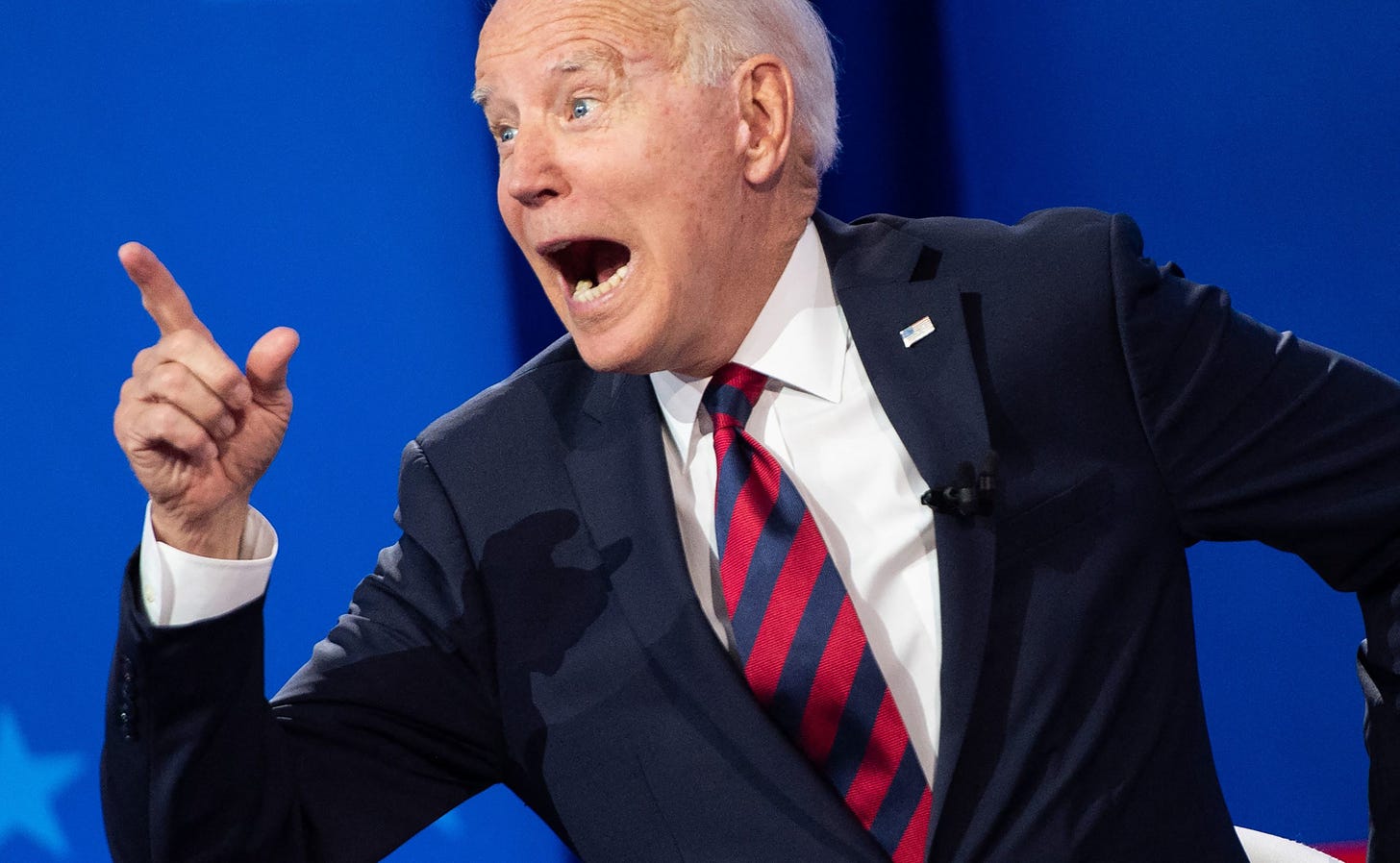Team Biden vs. COVID Misinformation
Facebook, Fox, the ‘disinformation dozen’—and the implications for our democracy.

Joe Biden wants you to know that when it comes to the coronavirus, he’s had it with misinformation.
In a town hall meeting last night in Cincinnati, the president said that we must “trust the scientists” and that his administration will “use every avenue we can to get the facts out—what they really are.” These are just the latest remarks in a week of White House officials calling out purveyors of misinformation about COVID and the vaccines.
Last week, the surgeon general, Dr. Vivek Murthy, came to the White House to unveil a report on “countering health misinformation.” “As someone who has lost ten family members to COVID” before the vaccines were available, Murthy said, “it’s painful for me to know that nearly every death we are seeing now from COVID-19 could have been prevented.”
Standing beside him, Press Secretary Jen Psaki called out a dozen people—the “disinformation dozen”—who, according to a British think tank, were responsible for about 65 percent of the misinformation on social media during a six-week period this winter. Although that think tank analysis was published four months ago, all twelve of those individuals “remain active on Facebook,” Psaki said, “despite some even being banned on other platforms,” including platforms that Facebook owns.
Returning to the theme during Monday’s briefing, Psaki seemed almost apoplectic as she appealed to people to get vaccinated:
I mean, we’ve seen—just over the last couple of days, there was a poll that showed that about 20 percent of the public thinks that microchips are embedded in vaccines. Now, we all know that’s inaccurate and not true. But why does 20 percent of the public think it? Is it one platform’s fault? No. Is it one outlet’s fault? No. But we all have a responsibility to make sure accurate information is out there.
Psaki also had to clarify a casual remark from the president about medical misinformation—a remark that could itself be interpreted as a bit of misinformation. Upon departing from the White House for Camp David on Friday, Biden took one question—and made a point as he approached the rope line of telling us that misinformation in social media is “killing people.” After a weekend of swirling news stories, Biden tried to walk back his remark on Monday morning, and then Psaki did, too:
I would just go back to the point that our fight is not with one social media platform; it is with the virus. And we have a role, who—everybody has a role in combating misinformation. . . . But again, this is not about one platform. This is about misinformation that we’re seeing travel around, into the minds—the inboxes, the minds, the—of individuals, of people around the country—inaccurate information that is preventing people from taking the step to getting vaccinated. And that is, of course, a public health concern for us.
And after days of calling Facebook and other platforms on the carpet, the administration also went after another big propagator of vaccine skepticism: Fox News. Reports emerged this week that the White House has had discussions with Fox about its coverage—perhaps a factor in the bizarre spectacle of some of the network’s big names flipping to begin recommending vaccination. At his town hall last night, Biden mocked Fox for the sudden change, but then stopped himself: “I shouldn’t make fun—that’s good. It’s good.”

There are two other, related problems with the White House’s anti-misinformation campaign. One is that misinformation has long been a major part of the American political diet. It has been used so often by so many politicians, that many Americans who have doubts about the vaccine have them because their default setting is to think that the government is lying to us about everything—even about this life-and-death matter.
The other problem is that, considering the size of the vaccine-skeptical population, there are incentives for politicians to distort the truth. Members of the GOP who have much to gain (namely power and money) from the bonfire of falsehoods are more than eager to fan the flames.
Like any other administration, the Biden administration is guilty of spreading misinformation—but so far, not out of malice. It has done so mostly because the administration hasn’t been clear on its messaging. For example, this week the White House announced someone in the administration had contracted COVID. This is an interesting and potentially important story—a breakout case, maybe in proximity to the president, is worth knowing about—but the White House was unclear about who it was and the position that person holds in the administration. It took four attempts by reporters to set the record straight on Tuesday, and Psaki apologized for being unclear.
The misinformation problem in our political life extends far beyond the pandemic. To take just one example from this week: Kevin McCarthy plays partisan politics and spreads misinformation about the insurrection because he doesn’t want to face the music—including the widespread suspicion that Republican officeholders were involved in the January 6 insurrection. He doesn’t want that investigated.
But the White House can’t spend all its time and energy on the misinformation beat. In speaking with a group of congressional Democrats Monday night, they all told me they think our democracy is hanging by a thread. More than one senior White House source has made it clear they are aware of the closing window to enact meaningful reform. President Biden can’t take on every accusation, every bit of misinformation thrown in his path. He has limited time to make the profound changes needed to steer the ship of state out of the shallows of authoritarianism and back into the deep channel of democracy.





